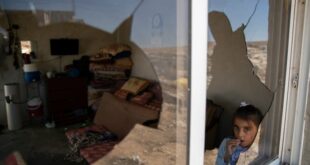Niger has been an important ally in the war against terrorism, but Western allies are cutting ties


The unpredictable military coup that threw Niger into turmoil is forcing Western nations, including Canada, to reconsider whether the money they've invested in the West African nation is being put to good use.
Global Affairs Canada said in a statement the coup is a serious threat to democracy and stability in the region. It also puts Canadian military assistance into question, some experts say.
Over the past 20 years, Canada has invested nearly $600 million in the African nation, but the federal government announced on Saturday it is suspending all direct funding to Niger's government.
Mohamed Bazoum, Niger's ousted president, published a piece in the Washington Post urging the international community to "help us restore our constitutional order."
Bruno Charbonneau, director of the Centre on Security and Crisis Governance at the Royal Military College in Saint-Jean-sur-Richelieu, Que., spoke with The Current guest host Catherine Cullen about what's at stake for democracy abroad, as well as the relationship between Canada and Niger. Here's part of their conversation.
Do you think the article Bazoum put out in the Washington Post is part of an attempt by him to rally the international community to his side?
Yes, absolutely. I mean, I think the only way he can get back in as president is to somehow figure out a way to increase international pressure on the military officers in charge of the coup so that they negotiate and accept that he comes back somehow.
But that's also a sort of conundrum given that if he comes back with that sort of support now, then some would certainly point out that he might be a sort of French puppet or international puppet.
I think his political legitimacy at this point is undermined either way, so we'll have to wait and see. But it's not a given. It's far from done that he'll be back in power any time soon.
The investments that Canada has made in Niger have been focused on development and security projects along with some military assistance. What does this coup tell us about whether the West was making the right choices with those interventions?
You have to look at the investment in the larger picture of the region. In the last 10 years in particular, if you're talking about military, security or foreign assistance, for instance, Canada has sent up to 50 soldiers every year to do a couple weeks of training at the tactical level, usually for the Nigerian forces.
But that's in the context of having 1,500 French troops and almost 2,000 American troops. The Germans and the Italians also have something like 800 troops each, so it's part of a larger effort of trying to capacity-build the state in response to the jihadist crisis that started in Mali in 2012.
So what would a better alternative be in terms of how Canada in particular intervenes?
Well, there's a limit to what we can do. And what I mean by that is those secure assistance programs are usually limited to tactical levels. So you train the military to do military things. But a military coup is obviously about something else. It's about the public institutions, it's about the state institution, it's about civilian military relationships, civilian control of the military and security forces.
And those things are usually addressed through other programs, usually called the security sector reform. It involves the reform of state institutions, judiciary and so on and so forth. But again, that talks about national dynamics. So, what is in Niger or Mali or Burkina Faso states? How historically and politically have those relationships evolved and how much can you influence the foreign power?
What do you hope people take away from this conversation about what is at stake right now?
Well, what is at stake is definitely the future of the region, I would say, not only of Niger democracy, but also the region.
I mean, the next step would be to see how the international community responds. France and its European partners will probably be asked to leave. And then will they turn to Chad? What will happen in Chad I think matters. We need to also look at Nigeria, the close neighbour and regional continental power in the region that has been very worried about the events in Niger.
We'll have to see how all these connections evolve, and also — we don't have to talk about it — but also the connection to the Sudan conflict. So Chad is in the middle now between Sudan and Niger, and if somehow Chad were to fall, that would make it even worse.

4 things to know about the unfolding coup in Niger
ABOUT THE AUTHOR

Journalist
Magan Carty is a radio and digital producer with As It Happens and The Current in Toronto. Originally from Ottawa, they possess a deep love of storytelling and come from a performance background, with over 10 years of experience across Canada as an actor. Magan has written and reported for CBC News, Yukon News, Glue Magazine and The Algonquin Times. You can reach them at magan.carty@cbc.ca
Audio produced by Niza Lyapa Nondo. With files from The Associated Press
*****
Credit belongs to : www.cbc.ca
 MaharlikaNews | Canada Leading Online Filipino Newspaper Portal The No. 1 most engaged information website for Filipino – Canadian in Canada. MaharlikaNews.com received almost a quarter a million visitors in 2020.
MaharlikaNews | Canada Leading Online Filipino Newspaper Portal The No. 1 most engaged information website for Filipino – Canadian in Canada. MaharlikaNews.com received almost a quarter a million visitors in 2020.







